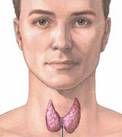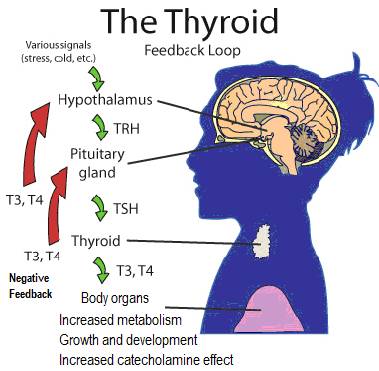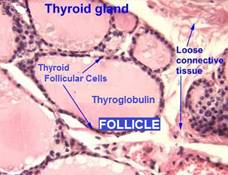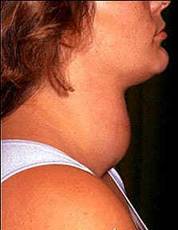What is hyperthyroidism?

Hyperthyroidism occurs when overactive thyroid tissue produces TOO MUCH thyroid hormone (T3 and T4)
Hyperthyroidism can be a cause of / lead to:
- Thyrotoxicosis. An excessive presence of thyroid hormones.
- Diffuse toxic goiter / Graves disease
- Thyroid cancer
What causes hyperthyroidism?
Hyperthyroidism occurs as a consequence of any of the following conditions:
- Iodine deficiency . Hydrogen peroxide (H2O2) and the thyroid peroxidase enzyme (TPO) help oxidize iodide to iodine needed to make thyroid hormones; A deficiency of iodine results in an excess amount of unused H2O2, which is able to damage TPO; the body’s response to damaged TPO is to produce antibodies against TPO (anti-TPO antibodies), leading to so called autoimmune diseases E.g. Hashimoto’s thyroiditis and Graves Disease (70-90% of Hyperthroidism cases) – Provision of iodine stops the injury to TPO, which resolves the condition.
- Thyroid cells damaged by inflammation, which release too much thyroid hormone into the blood stream. Hypothyroidism usually follows because the damaged thyroid is not producing enough thyroid hormone and the stored hormones are eventually depleted. Inflammation can be induced by several factors, including auto-antibodies (E.g. in Graves disease), microbial infection, radiation damage, toxins, food allergies (i.e., gluten intolerance), and nutritional imbalances.
- TSH Receptor Antibodies (TRAbs). Auto-antibodies that bind to TSH receptors on thyroid follicular cells and continuously stimulate the thyroid to secrete T4 and T3, which quantities become excessive. TRAbs are detected in >90% of Graves Disease patients.
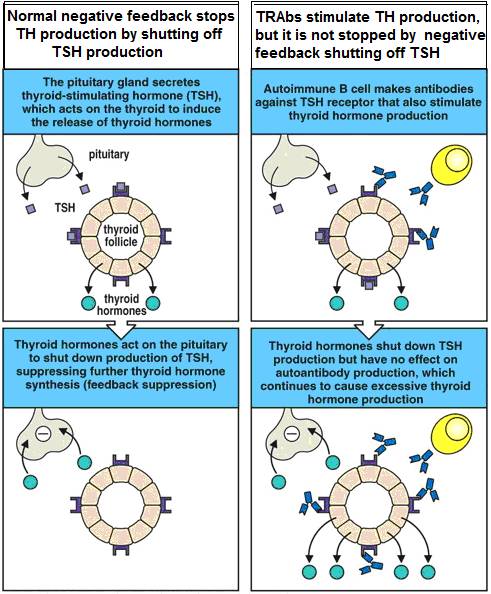
Examples of Hyperthyroid hormone levels | ||
Hormone | Example Hyperthyroid level | Normal level range |
| T4 | 50.3 pmo1/L | 8.0 – 23.0 pmo1/L |
| T3 | 6.5 nmo1/L | 0.9 – 2.8 nmo1/L |
| TSH | < 0.10 mU/L | 0.40 – 5.00 mU/L |
Symptoms / Effects of HYPERthyroidism | |
Typical Symptoms Include: | |
| Weight loss – despite increased appetite | Nervousness, Anxiety, irritability |
| Heat intolerance | Tremors in hands/fingers |
| Muscle weakness/aches | Fatigue |
| Excessive production/excretion of urine (Polyuria) / Excessive thirst | Hyperactivity |
| Apathy | Hypoglycemia |
| Non-pitting edema over the shin (Pretibial myxedema) | Sweating |
| Can also include: | |
| Palpitations/ increased heart rate / Arrhythmia | Memory loss |
| Diarrhea | Insomnia |
| Loss of libido | Pain in thyroid gland (at front of neck) |
| Shortness of breath (dyspnea) | Light/absent menses |
Nausea/Vomiting |
|
Hyperthyroid hormonal effects
Excess TH stimulates release of adrenocorticotropic hormone (ACTH), the “stress”hormone. This causes adrenals to kick into high gear with “fight-or-flight” reactions, such as increasing heart-rate, breathing, blood pressure and body temperature, hormonally controlled by:
- EPINEPHRINE. Increases heart-rate, opens airway to bring in more oxygen with each breath, constricts blood vessels to non-vital organs to provide blood to vital organs;
- NOREPINEPHRINE. Constricts major blood vessels and increases blood pressure;
- CORTISOL. Increases INSULIN sensitivity, allowing cells to “Burn” more glucose for energy;
Your body can sustain this heightened state for a limited time before experiencing cell and tissue damage
Health problems associated with excess thyroid hormone
- Grave’s Disease (70-90% of hyperthyroidism). Common thyroid-specific autoimmune disease, unique in being associated with target organ hyperfunction rather than organ damage; affects~ 4 in 10,000 people / year;
- Atrial fibrillation and tachycardia
- Increased cell metabolism. This signals the pancreas to produce more INSULIN to burn more glucose, and decreases glucose conversion for fat storage.
- Alters vitamin metabolism
- Draws calcium from bones. Partly because of altered vitamin metabolism and also to meet calcium needs of “speeding” cardiac system.
- Thyroid damage
- Thyroiditis. E.g. due to:
- Inflammation in Autoimmune Hashimoto’s Thyroiditis or inflammation caused by toxic substances / radiation exposure. May develop an overactive thyroid (rather than the usual hypothyroidism) for a short period, due to release of thyroid hormone from damaged thyroid cells. This is followed by a usually short-lived period of time when the thyroid functions properly, and as scarring sets in, hypothyroidism results.
- Postpartum thyroiditis (first phase)
- Drugs / iodine. E.g. Amiodarone (CORDARONE), interferon-alpha, and lithium (LITHOBID); excess iodine from supplements, certain expectorants, or iodine-containing contrast agents for x-ray studies may cause hyperthyroidism.
- Thyroid cancer
- Toxic thyroid nodules
- Overactive pituitary (rare cause). Can cause overstimulation of thyroid;














